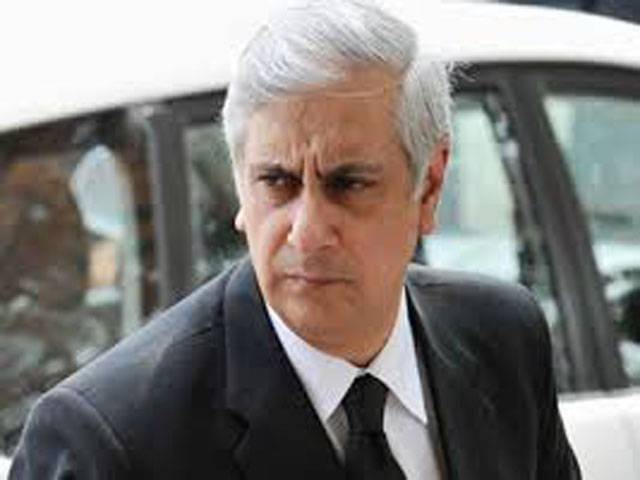ISLAMABAD - Post-election disqualification of a member of the parliament falls within the jurisdiction of the National Assembly speaker or Senate chairman and the Election Commission and the proceedings of the parliament cannot be called into question by courts.
Attorney General for Pakistan submitted this in his reply to the petition seeking disqualification of Prime Minister Nawaz Sharif as he had told a lie to the nation that he did not request the army chief to mediate or facilitate between the government and the PAT and PTI leaders who were protesting on the Constitution Avenue against the government.
The AGP statement filed, under Order XXVII-A of the Code of Civil Procedure 1908 as well as an officer of this august court, said the jurisdiction invoked by petitioner Gohar Nawaz Sindhu could not have been exercised due to the factual nature of the dispute and the requirements of the constitution reinforced with clarity in view of the 18th Amendment. The petition, therefore, is misconceived and not supported by law and is accordingly liable to be dismissed.
The reply said that the petitioner approached the Lahore High Court regarding the matter but a single bench dismissed it. He then filed intra-court appeal which was also dismissed by divisional bench of the LHC.
The Lahore High Court had twice dismissed the petition on the ground that the questions raised are non justiciable because they fall within the domain of a 'political question'.
The petition raises the question of the qualification of members of the parliament, which is not a fundamental right but a substantive part of the constitutional scheme. The petitioner did not cite any specific fundamental right which was said to have been violated.
Article 63 of the Constitution provides a complete mechanism with respect to the disqualification of a member of the parliament. A Parliamentarian enjoys complete freedom of speech in respect of anything said in Parliament and is not liable to any proceedings in this respect, except Article 68 imperatives. The members of the parliament could be disqualified by Speaker National Assembly or Chairman of the Senate, therefore, the Lahore High Court has rightly held that the matter is a "political question" and accordingly is not justiciable by the courts.
He said that the disqualification provided through Article 63 (1) (g), after the 18th Amendment now requires that the member should have been convicted by a court of competent jurisdiction for defaming or bringing into ridicule the judiciary or the Armed Forces of Pakistan.
He said the petitioner was unable to assist the court if there is a declaration already in the field or he seeks a declaration from this court to the effect that the PM is not "Honest" and "Ameen". He said that the apex court has already dealt with the meanings of "sadiq" and "ameen", in the case of Raja Muhammad Afzal versus Muhammad Altaf (1986 SCMR 1736). It is thus for the court of competent jurisdiction, within the scope of Article 175 (2), to give any such declaration.
The reply said that the petitioner relies on news items to deduce that the Prime Minister on 28.8.2014 requested the Army Chief to intervene in the political difficulty and to act as an arbitrator and guarantor. It stated this matter raises several factual controversies, which can only be established through submission of evidence. "It is established that courts in their constitutional jurisdictions exercise a discretionary power and may not enter into factual disputes."
Saturday, April 20, 2024
Only NA speaker, Senate chief can disqualify MP
| AGP tells SC parliament proceedings can't be called into question by courts

Policitising Tragedy
April 20, 2024
Tehran to Rafah
April 20, 2024
A New Leaf
April 20, 2024
A Tense Neighbourhood
April 19, 2024
Dubai Underwater
April 19, 2024
Dangers of Deepfakes
April 20, 2024
Feudalism
April 20, 2024
Kite tragedy
April 19, 2024
Discipline dilemma
April 19, 2024
Urgent plea
April 19, 2024
ePaper - Nawaiwaqt
Advertisement
Nawaiwaqt Group | Copyright © 2024





